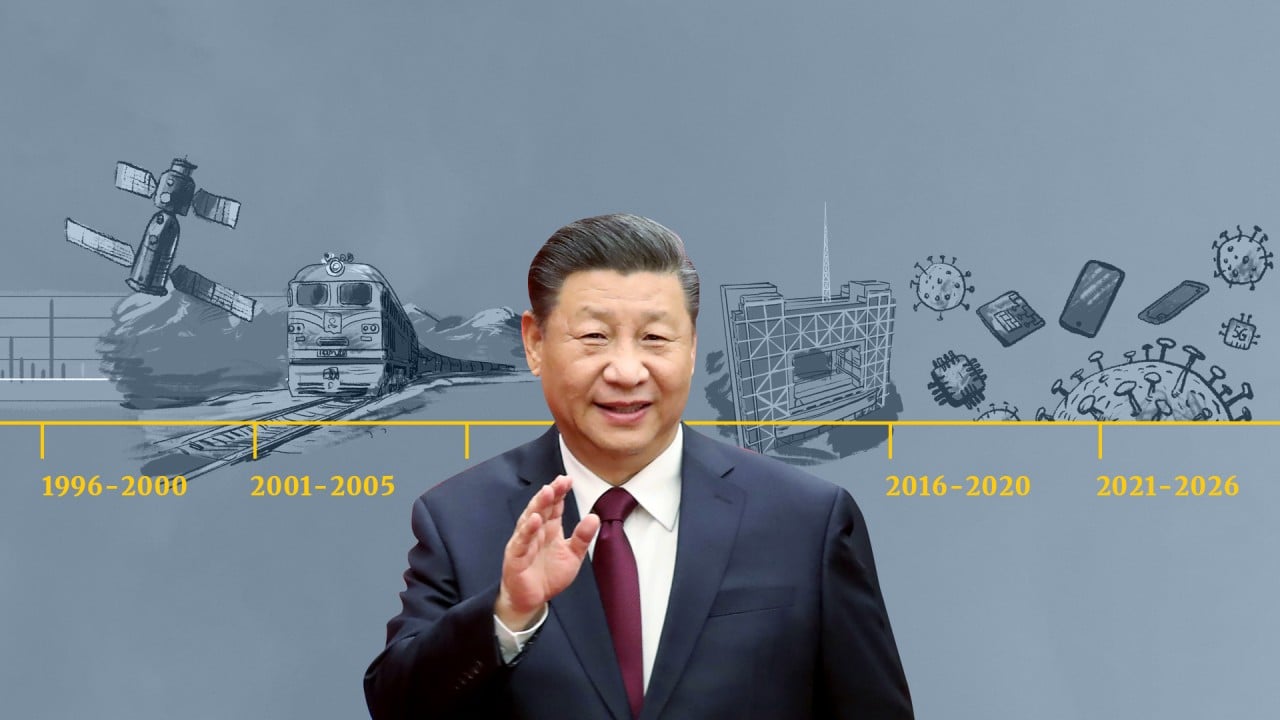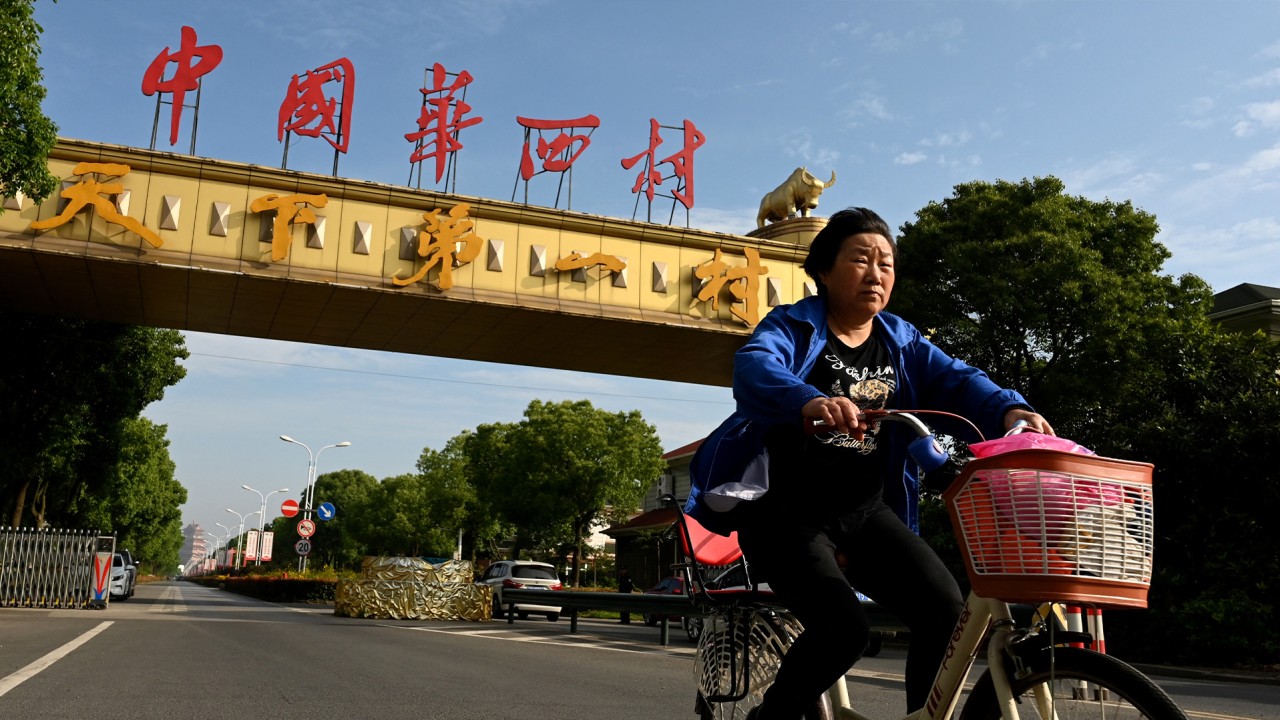
China’s path to common prosperity puts pressure on private enterprise
- Where the tech giants led, other entrepreneurs are following with lavish donations to charitable causes to meet the national goal
- The outpouring of generosity has raised questions about the long-term effectiveness of state-driven philanthropy
This is the final part of a series on China’s new push for “common prosperity”. Here, Jane Cai looks at the impact on the country’s wealthy.
Most famously, Tesla CEO and SpaceX founder Elon Musk and Amazon.com founder Jeff Bezos were called out by the UN World Food Programme’s director David Beasley, who said rich people like them should donate a fraction of their wealth to help fight starvation.
Elon Musk’s post of ancient Chinese poem spurs confusion on Twitter
Xi spelt out his “common prosperity” vision at a meeting with the Central Committee for Financial and Economic Affairs in August, in which he said “tertiary distribution” was one of the basic systems to address the yawning wealth gap and encouraged high-income earners and companies to “give back more to society”.
The concept of tertiary distribution was first coined by Peking University economist Li Yining in the 1990s and refers to philanthropic activities – donations, charities and volunteering – which take place after the other forms of wealth redistribution through incomes and taxation.
While it was mentioned in the party’s 2019 and 2020 plenums, and appeared in the country’s 2021-2025 economic and social development blueprint released last March, it generated little attention until Xi made his public call in the summer.
Since then, Chinese entrepreneurs have been busily setting aside special funds for the common prosperity programme, lending financial support to the leadership’s top concerns: education, health care, poverty alleviation, and so on.
The outpouring of benevolence and generosity can undoubtedly promote the spirit of philanthropy, but it has also raised doubts about whether policy-driven charitable donations can be effective in helping to reduce wealth inequality.
What is China’s common-prosperity strategy?
“Once the Chinese government has made it clear that it requires big corporations to donate or else, big corporations will continue to do so until it becomes clear that such donations are no longer required,” said Steve Tsang, director of the SOAS University of London’s China Institute.
“Donations are made first and foremost for their self-preservation. What and how the donations are used are secondary to the donors,” Tsang said.
The Chinese government started to tighten its control over the dynamic internet sector last November, when the initial public offering of Ant Group – an affiliate of e-commerce giant Alibaba Group – was halted at the last minute. Later, as an industry-wide monopoly probe kicked in, Alibaba was slapped with a record US$2.8 billion fine after it was found to have abused its market dominance. Alibaba owns the South China Morning Post.
Other casualties from the unprecedented clampdown included games publisher Tencent, online food delivery company Meituan, e-commerce platform Pinduoduo and ride-hailing app Didi. All were fined or had deals terminated for violations of antitrust or cybersecurity laws.
China’s digital economy not winner-take-all market, Xinhua says
Ernan Cui, an analyst with Gavekal Dragonomics in Hong Kong, said many people working in China’s internet companies believed Xi’s call for more to be given back to society was directed at them. “Feeling the political pressure, technology billionaires have already boosted their charitable donations this year,” she said.
Last year’s total cash donations by the 100 entrepreneurs on Forbes’ China Charity List amounted to 24.51 billion yuan (US$3.8 billion), a 37 per cent surge on the previous year. The tech industry, with donations of 7.8 billion yuan – 32 per cent of the total – ranked as the country’s most charitable sector.
In the first eight months of this year, five of China’s richest tech billionaires have pledged at least US$13 billion from their personal or corporate fortunes to charitable foundations and initiatives.
Brock Silvers, chief investment officer with Kaiyuan Capital in Hong Kong, wondered how long this generosity could continue before investors looked elsewhere for predictable corporate profitability.
“Chinese corporate support for social initiatives is a serious concern for Western investors. Despite the likely positive impact of the initiatives, billions of dollars are nonetheless being siphoned from shareholders, seemingly without much regard for their interests,” he said.

04:59
Xi Jinping declares ‘complete victory’ in China’s anti-poverty campaign, but some still left behind
To soothe these jitters, various party and government organs – from the National Development and Reform Commission to the Central Commission for Discipline Inspection – have clarified that China’s approach to “common prosperity” is not a Robin Hood-style redistribution and said charitable donations will be conducted voluntarily.
However, entrepreneurs from outside the internet sector said they were feeling the same pressure to donate and fall in line with the national goal.
Tom Wang, 45, co-founder of a medium-sized manufacturing company in the eastern province of Jiangsu, said he had donated a total of 1 million yuan to several projects so far this year. “I can’t say I was forced. We entrepreneurs are invited to chat with local officials monthly. When you are publicly asked whether to donate or not, you cannot say no. They give you face by summoning you,” he said.
“I’m glad for doing good deeds – funding public libraries, helping people affected by floods, etc. All levels of governments have been setting up charity organisations in recent years, making it easier for us to make charitable contributions. However, the air is like you don’t have good conscience if you say no. I feel a little uneasy under the pressure.”
China’s ‘common prosperity’ goal won’t mean Robin Hood-style redistribution
Min Zhou, director of the Asia Pacific Centre at the University of California Los Angeles (UCLA), follows global Chinese philanthropic activity and said the recent trend of charitable donating from the country’s business sector was driven primarily by government policy – making it hard to predict if the momentum would be maintained in future.
“Usually for companies, charitable donations are a form of investment with an expectation of returns, such as tax benefits, goodwill, publicity, etc. Since the current trend is driven by a powerful state, the risk may be high, possibly leading to asset transfer and even company closedown,” she said.
“At the moment, there is a lack of a well-established policy framework including tax incentives and well-developed civil society, such as independent non-profits and foundations in China, that help sustain the trend in the long run.”
While independent foundations are the predominant model in the United States and Europe, government-linked foundations are more common and active in China, especially in recent years as non-governmental organisations have come under heavy scrutiny as Beijing has tightened control over the private sector.

05:57
SCMP Explains: China’s five-year plans that map out the government priorities for development
China passed its first charity law in 2016, providing a tax credit for businesses making charitable donations and waiving corporate income tax on donations of up to 12 per cent of profits. In the US, corporations can apply up to 25 per cent of their taxable income as cash contributions to eligible charities.
The rapid development of online donation platforms has made it much easier to donate money in China, but the government could do even more to encourage donations, according to Katja Levy, a research fellow at the University of Manchester and co-author of the book Charity with Chinese Characteristics.
“Simplifying tax deductions for donors and increasing the deduction rates for charitable giving would be one way. The nationwide introduction of property or estate taxes could also encourage more charitable giving,” she said.
“The risk of too much government involvement is, of course, that the people and companies forget why they should donate and that they stop immediately once the pressure stops.”
Common-prosperity push has China’s rich and poor asking: ‘What’s next?’
The eastern province of Zhejiang – home to a slew of the country’s most successful private companies – was picked as the pilot region for the common prosperity goal – deemed crucial by the 100-year-old Communist Party for its rule into the next century.
Dozens of Zhejiang party cadres posed in September for a ceremony to mark Donation of One Day’s Salary. They were led by provincial party chief Yuan Jiajun, inserting yellow envelopes into a red donation box in front of Zhejiang Online’s camera.
For David Zhou, 48, who has a trading company in the province, the pressure to contribute has been turbocharged by Zhejiang’s role as the demonstration zone for common prosperity.
“Local government officials are actively promoting charity donations. Under such circumstances, companies have to show their support to the initiative by making donations and prove their loyalty to the party,” he said.

02:50
China’s model collective village in trouble as Communist Party marks 100th anniversary
“My business is not good this year and the burden is heavy to contribute to employees’ social welfare. Anyway, I’ve donated hundreds of thousands of yuan this year for various social causes.”
George Magnus, research associate at Oxford University’s China Centre, said: “Social programmes will of course benefit from receipt of donations, but philanthropy, even in the US, is a relatively small proportion of GDP, and doesn’t address important structural determinants of income and wealth distribution.”
“There’s certainly a political benefit in demonstrating to citizens that private firms and billionaires are being made to pay to good causes, but it’s really no substitute for proper policymaking,” he said.




